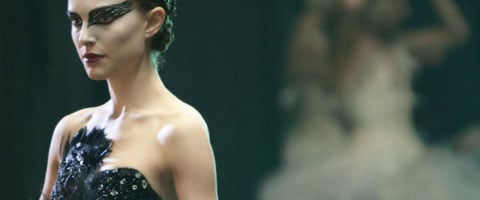Black Swan's Greatest Trick Was Convincing Oscar That It Isn't Horror

Your Daily Blend of Entertainment News
You are now subscribed
Your newsletter sign-up was successful
[note: Our ongoing series of Oscar Rants continues with Will's take on Best Pic nominee Black Swan. Watch for more Oscar Rants coming soon. Here's Will…]
There’s a formula you can follow to work your way in contention for the top prize at the Academy Awards. Heavy drama plus a few well placed laughs and two or three scenes that leave the audience choked with tears and you’ll have no problem landing among the elite ten being scrutinized for the Oscar’s best picture. But what if you’re a brilliant film that blurs the line between thriller and horror, two genres rarely considered for awards let alone best picture, until you can’t tell where one ends and the other begins? Enter Black Swan, Darren Aronofsky’s 2010 opus which, while teeming with personal drama, left us all watching half the movie through the spaces between our fingers.
The horror genre has been widely absent at the Academy Awards since their inception, save for a scant few that have weaseled their way in. Last year, District 9 clearly expressed horror elements, and before that 1999’s Sixth Sense found a spot among the leaders. That’s an 11 year stretch with only a few mild thrillers mixed in, and an even longer span before that. As a horror lover, I’ll be the first to admit that this omission is not entirely because the Academy is simply unwilling to consider the genre, the truth is most horror films simply aren’t good enough or innovative enough to compete with well thought out works like The Social Network or No Country for Old Men. There’s a stigma to awarding horror, and maybe it’s one that the genre’s earned.
Black Swan is different. At first disguising itself as “that ballet movie”, none of the film’s early viewers got what they were expecting. As the movie traveled through festivals, it unfolded its wings to reveal its next guise, as a psychological thriller. And yet, while it more closely resembles a thriller than a ballet movie, Black Swan’s final transformation is something else entirely. By the end of the Nina’s story it’s clear that it’s actually a horror movie, one that makes no apologies for shocking its unsuspecting audience, sure to cringe even more later, as they relive the memory telling their friends about it.

This year, the Academy recognized the horror genre by putting Black Swan in the top ten, perhaps in part because may not have even recognized it as a horror film. Many Oscar voters will have seen the film in its early stages under the preconceived notion that it’s just a drama or that it’s just a thriller, thus allowing them to cast their vote for Aronofsky’s latest without hesitation, free from the stigma of voting for an actual, honest-to-goodness horror film.
This isn’t a horror film like Dawn of the Dead is a horror film. And it’s certainly not a horror film like The Thing is a horror film. Black Swan has no ghosts or zombies or ghouls or demons (inner demons?) to hang on for its scares. It lives simply in the mind of Natalie Portman’s Nina who drives this film like she pulled it through the deepest depths of the human psyche, where real horror lives. Much like Carrie, Nina endures never ending torment from her mother and her peers until she snaps. The film burns slowly like a candle and as Nina’s wick of sanity reaches its end, the story explodes into a crescendo of dementia impossible to escape not only by Nina, but by audiences unable to look away.
Darren Aronofsky has not put horror “on the map”, he just managed to do it well enough that it looks like something else. In how many other dramas have you seen toenails break and skin pulled back to the bone amidst a backdrop of endless, taunting hallucinations? It doesn’t happen. Black Swan is a horror movie, but beyond the scares, perhaps it’s greatest trick is in convincing people who fear the genre that it isn’t part of it. Now that Black Swan on Oscar’s stage, it’s time deep and brooding horror took home the top prize.
Your Daily Blend of Entertainment News
[Read more Cinema Blend Oscar Rants right here.]
